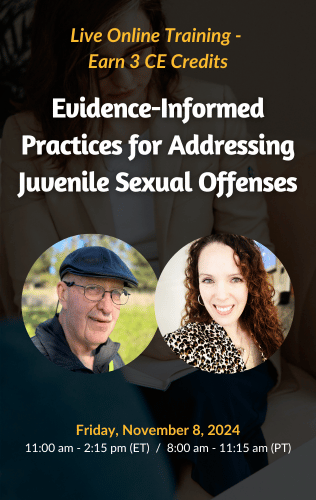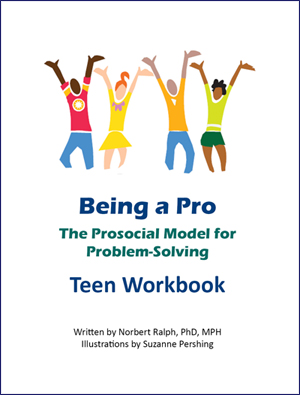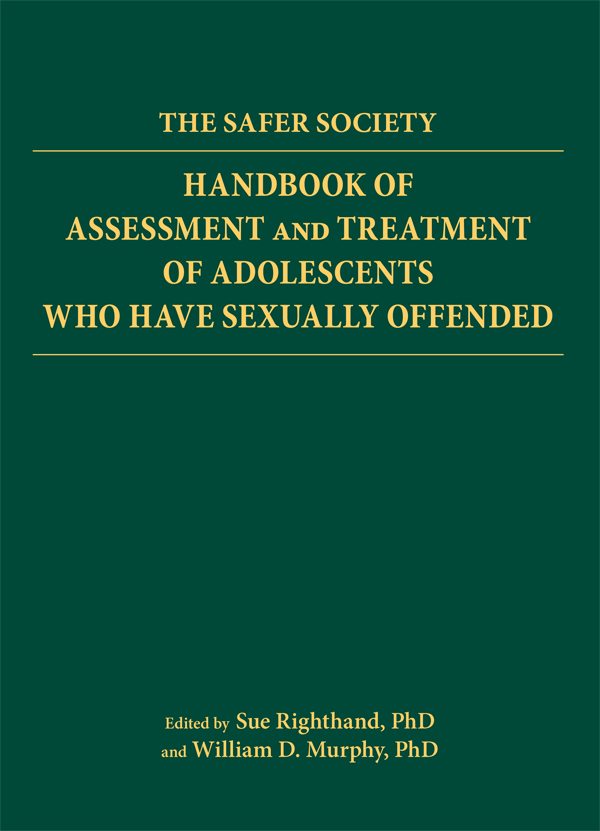Home / Shop / Online Trainings
Live Online Training - Evidence-Informed Practices for Addressing Juvenile Sexual Offenses

- Description
Date: November 8, 2024
Time: 11:00 am – 2:15 pm (ET) /
8:00 am – 11:15 am (PT)
Format: Live interactive training offered via Zoom
CE Eligibility: Psychology
Presented by: Norbert Ralph, Ph.D., MPH (See bio) and Mikaela Vidmar, MSc, Reg Psych (Canada), MA, Psy Assoc (California) (See bio)
You must attend the entire live training to be eligible for CE credits. The evaluation is optional, and you can remain anonymous.
Online Training Description:
Staying informed about the latest research and practice innovations is essential for practitioners working with juveniles who have sexually offended. This training is designed to equip professionals with the knowledge and resources necessary to understand, assess, and treat adolescents who have sexually abused. By delving into emerging research findings and best practices, this training addresses the complexities faced by practitioners striving to implement the most effective policies and programs.
The training offers practical tools and focuses on key areas, including:
- Recidivism Insights: Discussion on the significance of sexual and overall recidivism rates among adolescents
- Adolescent Brain Development: Examination of research on brain development and psychosocial maturity’s role in sexual aggression, noting adolescence as a high-risk period for crimes, substance use, accidents, and other problematic behaviors.
- Causal Factors: Analysis of modifiable risk factors in juvenile sexual abuse, such as the effects of prior adverse experiences, psychiatric conditions, and learning challenges.
- Collaborative Models: Strategies for collaboration between the youth, family, probation officer, and treatment provider.
- Assessment Tools: Identification of risk factors that can and can’t be modified.
- Effective Treatment Programs: Emphasis on principles and components of effective treatment models, focusing on program quality and fidelity issues, not necessarily specific “name-brand” programs.
- Scalable Treatment Programming: Description of treatment programming that can be readily implemented at scale and in a “therapist-friendly” fashion.
- Outcome Tracking Models: Presentation of practical models currently used to track program outcomes, providing useful tools for practitioners, programs, and other stakeholders.
By participating in this training, practitioners can significantly enhance their ability to make a positive impact on the lives of juveniles, contributing to a more effective and compassionate juvenile justice system.
As a result of participating in this training, attendees will be better able to:
1) Identify the distinctions between sexual and nonsexual recidivism to enhance intervention strategies.
2) Discover how adolescent brain development impacts harmful behaviors and informs prevention efforts.
3) Identify two assessment tools specific to adolescents who have sexually abused.
4) Analyze two treatment approaches designed to support the rehabilitation of adolescents who have sexually abused.
Continuing Education Credit Hours
Safer Society Foundation, Inc. is approved by the American Psychological Association (APA) to sponsor continuing education for psychologists. Safer Society Foundation, Inc. maintains responsibility for this program and its content.
We can refund your training fee up to 24 hours prior to the start of the training.
To view all training information, including a list of Frequently Asked Questions (FAQs), please visit the promotional page by clicking here.





